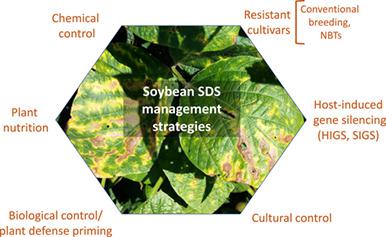当前位置:
X-MOL 学术
›
Pest Manag. Sci.
›
论文详情
Our official English website, www.x-mol.net, welcomes your feedback! (Note: you will need to create a separate account there.)
Current recommendations and novel strategies for sustainable management of soybean sudden death syndrome
Pest Management Science ( IF 4.1 ) Pub Date : 2021-05-04 , DOI: 10.1002/ps.6458 Maria C Rodriguez 1 , Francisco Sautua 2 , Mercedes Scandiani 3 , Marcelo Carmona 2 , Sebastián Asurmendi 1
Pest Management Science ( IF 4.1 ) Pub Date : 2021-05-04 , DOI: 10.1002/ps.6458 Maria C Rodriguez 1 , Francisco Sautua 2 , Mercedes Scandiani 3 , Marcelo Carmona 2 , Sebastián Asurmendi 1
Affiliation

|
The increase in food production requires reduction of the damage caused by plant pathogens, minimizing the environmental impact of management practices. Soil-borne pathogens are among the most relevant pathogens that affect soybean crop yield. Soybean sudden death syndrome (SDS), caused by several distinct species of Fusarium, produces significant yield losses in the leading soybean-producing countries in North and South America. Current management strategies for SDS are scarce since there are no highly resistant cultivars and only a few fungicide seed treatments are available. Because of this, innovative approaches for SDS management need to be developed. Here, we summarize recently explored strategies based on plant nutrition, biological control, priming of plant defenses, host-induced gene silencing, and the development of new SDS-resistance cultivars using precision breeding techniques. Finally, sustainable management of SDS should also consider cultural control practices with minimal environmental impact. © 2021 Society of Chemical Industry.
中文翻译:

大豆猝死综合征可持续管理的当前建议和新策略
粮食产量的增加需要减少植物病原体造成的损害,最大限度地减少管理做法对环境的影响。土传病原体是影响大豆作物产量的最相关病原体之一。大豆猝死综合征 (SDS),由几种不同的镰刀菌引起,在北美和南美的主要大豆生产国造成显着的产量损失。目前的 SDS 管理策略很少,因为没有高抗性品种,只有少数杀菌剂种子处理可用。因此,需要开发 SDS 管理的创新方法。在这里,我们总结了最近探索的基于植物营养、生物控制、植物防御启动、宿主诱导的基因沉默以及使用精确育种技术开发新的 SDS 抗性品种的策略。最后,SDS 的可持续管理还应考虑对环境影响最小的文化控制做法。© 2021 化学工业协会。
更新日期:2021-05-04
中文翻译:

大豆猝死综合征可持续管理的当前建议和新策略
粮食产量的增加需要减少植物病原体造成的损害,最大限度地减少管理做法对环境的影响。土传病原体是影响大豆作物产量的最相关病原体之一。大豆猝死综合征 (SDS),由几种不同的镰刀菌引起,在北美和南美的主要大豆生产国造成显着的产量损失。目前的 SDS 管理策略很少,因为没有高抗性品种,只有少数杀菌剂种子处理可用。因此,需要开发 SDS 管理的创新方法。在这里,我们总结了最近探索的基于植物营养、生物控制、植物防御启动、宿主诱导的基因沉默以及使用精确育种技术开发新的 SDS 抗性品种的策略。最后,SDS 的可持续管理还应考虑对环境影响最小的文化控制做法。© 2021 化学工业协会。


























 京公网安备 11010802027423号
京公网安备 11010802027423号